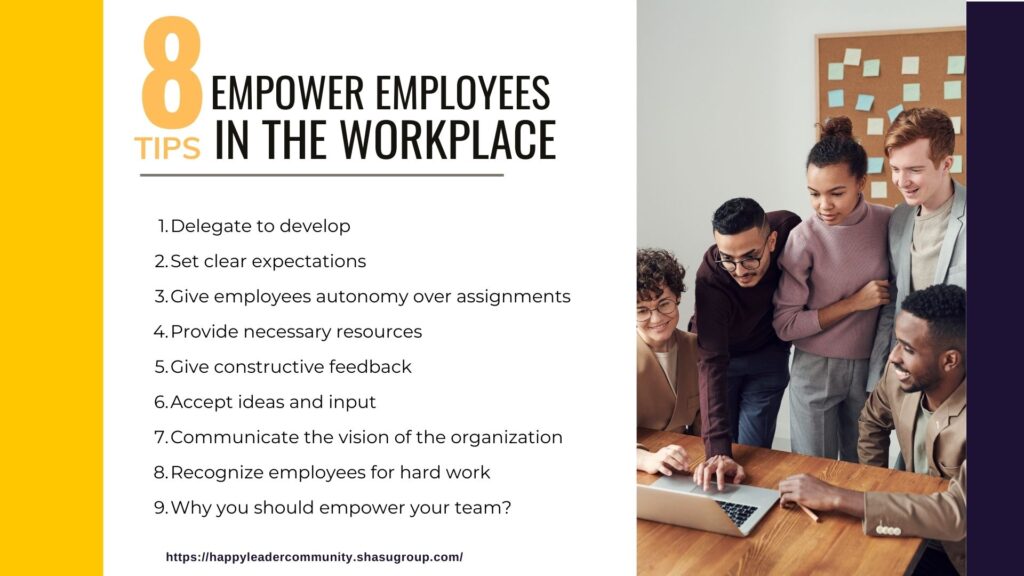The best leaders reach out to their people for clarity and positive changes. These questions are a great way to begin that conversation.
Anyone who owns a business is aware there are thousands of books and opinions out there regarding how to help make your business successful. Management guru Peter Drucker wrote a 100-page book titled, The Five Most Important Questions You Will Ever Ask About Your Organization. In this short but enlightening book, Drucker shared
everything he believed anyone needed to know about how to lead an organization and be successful in their business endeavors.
Take some time to ask your employees these crucial questions and allow them to freely answer and offer their thoughts on each one. You may find that by answering these questions together you open up a totally new view of what is important and a much stronger focus that could positively change the future of your business.
What is empowered teams?
Empowered teams are self-sufficient groups of people working together with specific goals. They have the corporate authority, experience, responsibility and skills to enact their own decisions for the organization. The highest level of management stabilizes the team’s direction, which drives the empowerment process by connecting it to the organization’s business needs and metrics. Management focuses on developing employees and supporting the organizational goals. The employees are committed to and responsible for organizational goals.
Tham gia cộng đồng học tập suốt đời cùng chúng tôi tại Happy Leader Community
8 Tips to Empower Employees in the Workplace

Delegate to develop
Delegating to take drudge work off your plate is often shortsighted and misses an opportunity to strengthen and empower your team. Instead, delegate with the intent to grow and develop the capabilities and responsibilities of your employees.
Set clear expectations
Define the boundaries within which your employee is free to act. By setting clear expectations (but not micromanaging them), you’re giving your employees permission to take make decisions while ensuring the decisions are in line with company goals.
Give employees autonomy over assignments
It’s okay if an employee doesn’t get from point A to point B using the same means you’d use. When you delegate, accept that this may mean your employee may complete the task differently than you would. Relinquish control, refrain from micromanaging, and accept that your way may not be the only (or best) way to complete a project.
Provide necessary resources
Many leaders complain that when they first start implementing employee empowerment practices in their organizations, they still get employees coming to their offices and expecting their problems to be magically resolved for them. Instead, offer tools, resources, and to be a sounding board for ideas.
Give constructive feedback
When debriefing on a project, be thoughtful and specific about the feedback you provide. Telling someone they did a “good job” doesn’t give them any direction for what to continue doing in the future. Be specific about the actions or attitudes you’d like to see repeated and the impact it had on others.
Accept ideas and input
When possible, include your employees in decision-making and goal-setting. If they can’t be involved in these preliminary processes, be open to hearing their ideas and input. Not only can being receptive to new ideas help empower your employees, it can also open up your organization to great new ideas.
Communicate the vision of the organization
It’s becoming more and more important for employees to feel like they are contributing to building something as opposed to just another cog in the wheel. By clearly communicating the vision of the organization and how a team and its individuals contribute to that vision, you are empowering your employees with the knowledge that their contribution is making a difference.
Recognize employees for hard work
Showing appreciation for work well done makes it more likely that a person will do it again (and do it even better). It will also encourage them to continue to be innovative, take action, and to solve problems. Don’t be stingy with your thank you’s.Why should you empower employees? Think of your dream team. Is it a bunch of workhorses who do precisely what you say (no more and no less)? Or is it a team of knowledgeable professionals who take initiative and use their skills to problem solve, innovate, and help the company achieve a common goal?We’re guessing it’s the latter. While your company can likely achieve a certain amount of growth under your direct management, true and sustainable company growth takes a capable team of empowered employees.
Why you should empower your team?
Empowering employees is important for growing a sustainable business. While many companies may grow ground-up from the hard work and dedication of one or two entrepreneurs, true growth is the product of multiple people working together. “Multiplying” yourself (as opposed to a strict leader-follower mindset) multiplies your organization’s strength and capabilities.
Five essential questions that enliven and empower teams

What is your mission?
Every business needs a reason to be, and this is most often encapsulated in a concisely worded mission statement. This shouldn’t be an elaborate document you file away in a drawer, but one that your organization and people live by every day of the week. Says Drucker, “The effective mission statement is short and sharply focused. It should fit on a T-shirt. The mission says why you do what you do, not the means by which you do it.”
Xem thêm về các nhóm của chúng tôi tại đây
What is your plan?
Given how quickly everything changes today, it’s more important to have a plan than ever. For a plan to be effective, it should comprise certain elements. According to Drucker, “A plan … is a concise summation of the organization’s purpose and future direction. The plan encompasses mission, vision, goals, objectives, action steps, a budget, and appraisal.” If you or your team can’t answer this question, you won’t know where you’re going or how you’re getting there.
What are your results?
Every initiative you undertake will have results, which will need to be collected and reviewed. Says Drucker, “Progress and achievement can be appraised in qualitative and quantitative terms. These two types of measures are interwoven — they shed light on one another — and both are necessary to illuminate in what ways and to what extent lives are being changed.” You and your team should make sure you know not just what your results are, but how you can evaluate them.
Who is your customer?
In many cases, a company’s leaders are uncertain about whom, exactly, their customers are. And even if they have some idea, these leaders fail to make their customers the primary focus of their attention. According to Drucker, “Answering the question ‘Who is our customer?’ provides the basis for determining that customer’s value, defining your results, and developing the plan.” Once you figure out who your customers are, then focus your efforts on satisfying their needs.
What does your customer value?
The natural next step is to figure out what your customer values and what they’re willing to pay for it. However, this may not be an easy question to answer. Drucker writes, “The question ‘What do customers value?’ — what satisfies their needs, wants, and aspiration — is so complicated that it can only be answered by customers themselves.” While this may be the most important of the five questions, he says, it’s also the one that businesses most often fail to ask themselves.
Collection & Edit by Marketing Dept from Team Happy Leader Community – Shasu Group
Sign up now LEADERS DEVELOPMENT TRAI
Follow us:
- Facebook: https://www.facebook.com/HappyLeaderCommunity
- Website: https://happyleadercommunity.shasugroup.com
Our Services
- Business Consultant: https://consultant.shasugroup.com/
- Executive, Business, Performance, Leadership Coaching & Mentoring: https://www.shasugroup.com/coaching-mentoring-consulting
- Training Solution: https://training.shasugroup.com/
- Fundraising & M&A Consultant: http://invest.shasugroup.com/
- International Sales Connection Service: http://export.shasugroup.com/
- Headhunter(Recruitment Service): https://hrstrategyvn.shasugroup.com/










